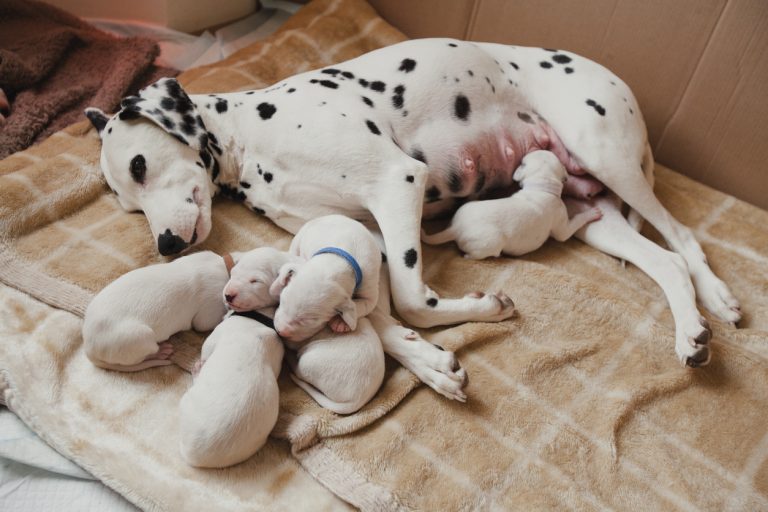Barking Mad Dog Care’s Guide to Dog Pregnancy
At Barking Mad, the UK’s leading dog sitting service, we are interested in all stages of a dog’s life cycle! We get very excited about the pitter patter of tiny paws and decided to compile a guide all about dog pregnancy. The creation of adorable, little bundles of fluff, who have the power to light up human lives with their capacity for love and devotion, is just incredible! Read on and hopefully we will answer all your questions around pregnancy in dogs.

When can a dog become pregnant?
The time when a female dog can become pregnant is known as either a ‘season’, ‘heat’ or ‘oestrus’. Unspayed female dogs usually come into heat twice yearly. This normally lasts for three weeks but this can differ from dog to dog. Seasons usually begin when a dog is aged between 6-36 months, but this can vary enormously.
It is advisable to have your dog checked by a vet if you are worried that they have not started their seasons by the usual time suggested for their breed. Dogs can’t get pregnant when they are not in season, although sperm can lie dormant inside their reproductive system for a week.
How long does a dog pregnancy last?
Pregnancy in dogs, is also known as dog gestation period can vary between 56-70 days, depending on the exact time of fertilisation in relation to mating. However, female dogs usually give birth around 63 days after conception.
What are the signs of dog pregnancy?
If your dog is expecting, you might not see any noticeable changes until later in the pregnancy. However, here are some dog pregnancy signs, ‘if you are wondering is my dog pregnant?’:
Early dog pregnancy symptoms
There is a chance that your dog may suffer from ‘morning sickness’ and vomit
– Changes to appetite
– Slightly enlarged nipples
– More affectionate behaviour
– Clear vaginal discharge
– Tiredness/decrease in physical activity
Later pregnancy symptoms
– Weight gain
– Teats may become more prominent and also darker. They may also produce a semi-clear fluid
– Increased appetite
– Changes in behaviour
– Enlarged, firm abdomen
– Visible puppy movement in abdomen
Can you get a home dog pregnancy test?
Unlike humans, who can just pop out and buy a home pregnancy testing kit from a chemist or supermarket, dogs need to have their pregnancy confirmed by a vet. You should try to give the vet your best estimate of the time of mating, because methods of confirming a dog pregnancy are time sensitive. Your vet may use a hormone test, an ultra-sound or a physical examination, involving palpating your dog’s abdomen.
Why is my pregnant dog barking?
Pregnancy can bring about behavioural changes in dogs, including increased vocalisation such as barking. There are several reasons why a pregnant dog may bark more frequently. Firstly, hormonal changes during pregnancy can affect a dog’s mood and behaviour, potentially leading to increased excitability or restlessness, which may manifest as barking. Additionally, dog pregnancy can cause physical discomfort such as hormonal fluctuations, weight gain, or changes in posture, which might prompt a dog to express discomfort or seek attention. Plus, heightened maternal instincts during pregnancy may make a dog more protective or territorial, leading to increased barking in response to perceived threats or to alert their owners. It’s essential to observe your dog’s behaviour closely during pregnancy and provide comfort and support as needed, while also ensuring they receive appropriate veterinary care to address any underlying issues contributing to excessive barking.

What should dog owners consider when thinking about breeding from their dog?
The decision of when you should breed from your dog is not always a straightforward one. Here are some points you should consider:
All vaccinations should be up to date whilst your dog is pregnant and lactating, so remember to check with your vet before considering breeding from them.
You shouldn’t allow your dog to have puppies until she is fully grown and mature herself. For most breeds, pregnancy isn’t recommended until at least 2 years of age.
It isn’t advisable to breed from an older bitch. Many vets recommend that the ideal age for delivering a litter is between 2 and 5 years old. However, the upper limit will depend on your dog as an individual. Consideration must be given to their breed, reproductive history and your own vet’s specific advice.
You should also consult your vet, or the Kennel Club, for advice on any screening schemes or precautionary measures that are advised for your particular breed of dog before you commit to a litter of puppies.
Here is a dog pregnancy information page from Vet 4 Life which you may also find useful.
Do dogs give birth at night?
Dogs can give birth at any time of the day or night. However, whether a dog gives birth during the night or day can vary depending on individual factors such as the dog’s natural instincts, comfort level, and environmental conditions. Dogs often choose secluded areas to give birth to feel safe and some dogs may exhibit behaviours such as restlessness or nesting in the hours leading up to labour, which could potentially coincide with night time. However, dogs can also give birth during the day if they feel safe and comfortable in their environment. Ultimately, the timing of a dog’s labour can be influenced by various factors and can differ from one dog to another.
The dog birth process
Although you should interfere as little as possible, it’s very important to be with your dog whist she is giving birth. You can support her and step in if there are any problems. Labour normally lasts 3-12 hours, and happens in three stages:
First stage
Your dog will show ‘nesting’ behaviour, may become picky about food, and will experience a drop in body temperature. This may last for up to 24 hours.
Second stage
Your dog will start to strain. If this lasts for more than two hours, contact your vet immediately. There will be discharge and the presentation of a round membrane sac of water. The birth of the first puppy is usually about half an hour afterwards.
Third stage
Each puppy is enclosed in a sac which is part of the placenta or afterbirth. It is usually broken at birth and passed after each puppy is born. Your dog will usually chew at the umbilical cord and break it about an inch from each puppy.
What should I do to prepare for my dog giving birth?
Build your dog a nest – Make sure that your dog has a private place to relax and give birth in. A good choice could be a large cardboard box lined with puppy pads and clean bedding. Adding your dog’s own (clean) toys and bedding can encourage her to use it.
Know the signs of labour and what to look out for during birth – Talk to your vet beforehand and read up on what you can do to help if intervention is required.
Be organised – Have your vet’s emergency number to hand as dogs often give birth at night. You will also need to ensure that you have transport available, should you need to take your dog to the vet’s practice during labour. Organise essentials such as clean, dry towels and nail scissors, well in advance. It is also a good idea to have microwavable bean bags on hand to provide warmth, if you must move puppies away from their mum.
How can I avoid dog pregnancies?
If you are sure that you do not wish your dog to have puppies, you may wish to consider neutering or ‘spaying’. Spaying is a process where female dogs are surgically prevented from reproducing. The Blue Cross offers advice on neutering here.
Are you ready for the pitter patter of tiny paws?https://www.bluecross.org.uk/pet-advice/neutering
We love puppies at Barking Mad Dog Care! If you are considering getting a puppy, or keeping one from your own dog’s litter, have you thought about what will happen when you want to go away on holiday? Once they have had all their vaccinations and made progress with house training, we will be happy to consider placing them with one of our experienced host families.
Every puppy is different, and we would need to make sure that we have suitable host availability for your chosen dates. With this in mind, we would recommend that you don’t leave registering your puppy with Barking Mad’s dog sitting service until the last minute. Why not find your local branch and have a chat to them about your new furry friend today?
Please note: Barking Mad, the UK’s leading home dog boarding provider, assumes no liability for the content of this page. This advice is not a substitute for a proper consultation with a vet and is only intended as a guide. Please contact your local veterinary practice for advice or treatment immediately if you are worried about your pet’s health – even if they are closed, they will always have an out of hours service available.




